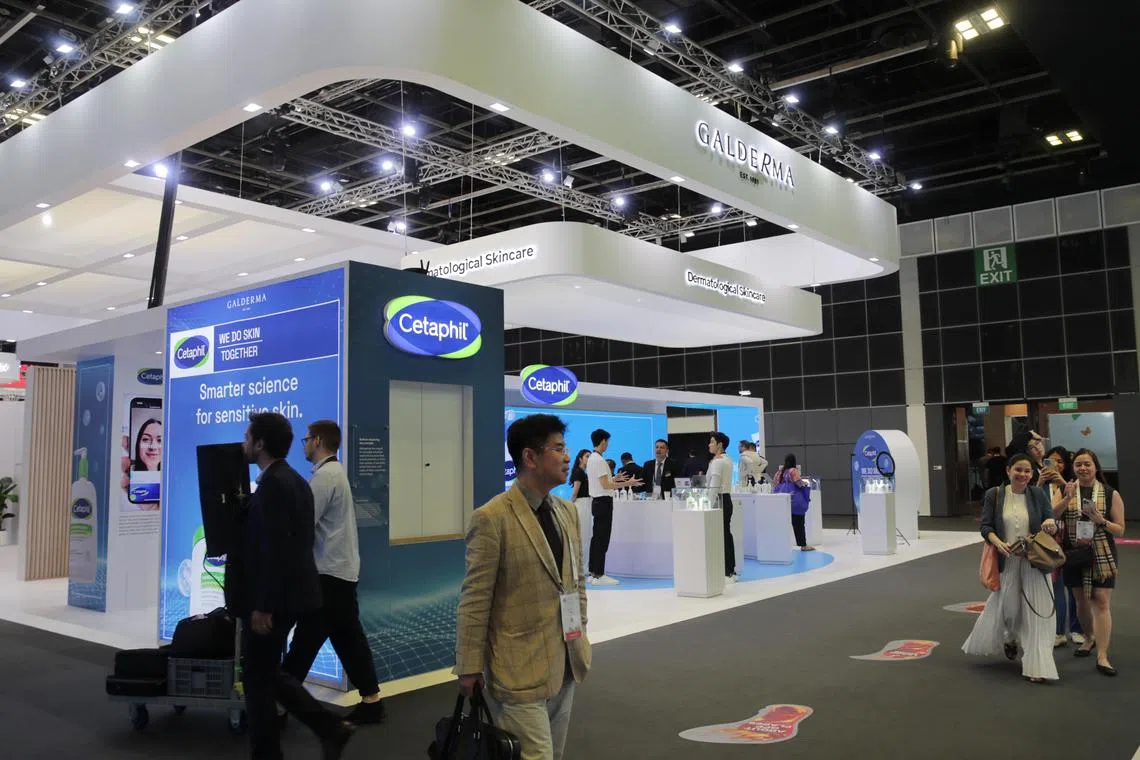Promising new treatments for skin conditions at World Congress of Dermatology
Sign up now: Get ST's newsletters delivered to your inbox

More than 11,400 delegates from 150 countries attended the 25th World Congress of Dermatology held at Suntec Singapore Convention & Exhibition Centre.
ST PHOTO: GIN TAY
Follow topic:
SINGAPORE – New treatments for skin conditions such as psoriasis, eczema, vitiligo and melasma were among the latest developments showcased at the 25th World Congress of Dermatology (WCD),
Over the past decade, dermatology has been second only to cancer in terms of having new targeted treatments, said Professor Lars French, who last week ended his four-year term as president of the International League of Dermatological Societies, which has been organising the WCD since 1889.
“Where we did not have effective therapies before, now we have groundbreaking new types of therapies coming with very good clinical data,” he said.
The congress, held every four years, gives clinicians a chance to find out what new options there are for their patients, he added.
“It is no use having these therapies that only university or academic departments know to use. It’s very important for such a congress to teach all dermatologists around the world of the potential of these medications, so that the maximum number of patients can benefit.”
Prof French said skin conditions, which affect more than half the world’s population, can range from deadly melanoma, an aggressive form of skin cancer, to milder conditions such as pigmentation problems and acne. But even the milder forms of skin conditions can cause people to self-isolate from society and result in depression.
At 2023’s WCD, held at Suntec Singapore Convention & Exhibition Centre, more than 11,400 delegates from 150 countries learnt of the latest developments in skincare, as well as new products that will be hitting the markets soon. Delegates included scientists, clinicians, practitioners and manufacturers in both the medical and cosmetics sectors.
Janssen, part of pharmaceutical giant Johnson & Johnson, announced highly successful early clinical trial results for a drug to treat moderate to severe psoriasis, a chronic disease that causes itchy scaly patches for which there is currently no cure.
It will be conducting large-scale phase three clinical trials; if all goes well, it will give the world its first oral medication for psoriasis. Currently, such patients need to go for regular injections.
Associate Professor Steven Thng, a senior consultant at the National Skin Centre (NSC), found “two exciting developments” presented at the congress.
One is the approval in the United States for a new drug for vitiligo, a disease where the skin loses its colour, causing patches of milky-white skin. Prof Thng said: “This is the first new drug approved in the last 10 years for the condition.”
The other development occurred closer to home – it is for melasma, a condition which causes patchy dark pigmentation, often appearing on the face.
Prof Thng said five years of research here has “uncovered a totally new pathway that contributes to this disease”. Based on this discovery, a new drug has been developed and is now being tested on patients here.
“So far, the results have been promising. If successful, this will be the first new topical treatment for melasma in many years,” said Prof Thng.
His colleague, senior consultant Yew Yik Weng, is looking forward to new treatments in the pipeline for eczema, which affects one in five children and one in five adults. The condition causes dry, itchy and sometimes bumpy skin.
Dr Yew said NSC treats about 10,000 patients a year for the condition alone. Several new treatments are in the final stage of clinical trials and should become available in the next year or two.
New treatments and applications were also showcased at the congress by cosmetics companies.
Causes of ageing, pigmented or inflamed skin are well known: They include smoking, radiation from the sun, lack of sleep, stress, air pollution, heat and poor nutrition.
Cosmetics companies focus on both prevention, particularly for radiation from the sun, and corrective treatments.
Prof French said that as people live longer, more will end up with skin cancer as the effects are cumulative over the years. Skin cancer is increasingly seen in people in their 70s, 80s and 90s, and one in three people will likely get skin cancer some time in their lives, he added.
The good news is that the vast majority of skin cancer cases can be stopped if discovered and treated early.
However, it is important to take preventive action against sun rays. Hence, the proliferation of sunscreen products and the recommendation to use them to protect against both ultraviolet (UV) A and B rays. UVA is more linked to ageing and wrinkled skin, while UVB is more likely to cause skin cancer.
French cosmetics firm L’Oreal, which has been around for more than a century, claims to be the cosmetics company with the largest investment in research and development. Its 4,000 scientists worldwide had €1.1 billion (S$1.62 billion) to draw on in 2022 for their research into products for its stable of brands that include La Roche Posay, CereVe and SkinCeuticals.
It claims that its La Roche Posay skincare is the cosmetics range most recommended by dermatologists globally because it is backed by clinical studies in conjunction with dermatologists.
Among its items promoted at the congress is the latest Anthelios UVMune 400 Invisible Fluid SPF50+ sunscreen, which it claims has “the most efficient UV filter against the most insidious UV rays”. It hit the market less than a year ago. The new protective formula will be rolled out to its other sun protective products in the coming years.
The company also promoted its Effaclar Duo+M for acne, which will be available here towards the end of 2023.

Visitors at the La Roche Posay booth at the 25th World Congress of Dermatology on July 4.
ST PHOTO: GIN TAY
Local brand Suu Balm, which was developed in conjunction with NSC, recently launched a shampoo for people suffering from sensitive, dry and flaky scalp. It said studies showed that scalp flaking is “significantly reduced after only seven days of use”.
If paired with Suu Balm Rapid Itch Relief Scalp Spray Moisturiser, similar results can be seen in four days, while the itching stops within minutes, according to the company.
Unilever, which started as a family-run business in Britain more than a century ago, now offers a range of brands, including Pond’s.
Pond’s featured two products at the WCD not yet on the market. One is the Niasorcinol serum to treat dark spots and skin dullness, and the other is the Hexyl-retinol serum, which it claims is “clinically proven to reduce the appearance of wrinkles by 58 per cent, improve elasticity by 30 per cent, and reduce the appearance of spots by 36 per cent”.
Cetaphil presented its range of creams and lotions for dry, sensitive skin, claiming that regular use of these would “fully restore the skin barrier within a week”. When the skin barrier is damaged, it allows irritants to enter and dehydration to occur, causing dry, flaky or red skin.
In response to a Straits Times query whether its dermatologists recommend cosmetics products, an NSC spokesman said the specialist centre “maintains a neutral stance and does not endorse or promote any specific brands”.
The choice of product recommended depends on both the patient’s condition and his personal preference, she said.
“However, it is worth noting that established skincare brands often meet the necessary requirements set by regulatory authorities, such as the Health Sciences Authority, and they can offer benefits to consumers with various skin conditions.”


